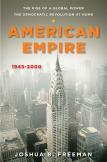Supersizing the Republic
In writing American Empire, Joshua Freeman handed himself a daunting assignment: to chronicle, and make sense of, the seismic forces that rocked and reshaped the United States and its place in the world over the turbulent decades stretching from the end of World War II to nearly the present day—in less than 500 pages.
The reader’s mind reels considering all the historic ground he has to cover, fast: from the civil rights movement to the beginning and end of the cold war, from Vietnam and the counterculture to the Reagan revolution. The rise of the Rust Belt and the Sun Belt, and the warp-speed spread of suburban living. Watergate. The terrorist attacks of Sept. 11, 2001. The supersizing—literally and figuratively—of a nation whose postwar wealth and power transformed it into a corporate, consumer and military global empire. But, Freeman stresses, an empire roiling from within over race, the role of government and what its cultural values should be.
Freeman, who teaches history at Queens College and the Graduate Center of the City University of New York, appears to be an author on a mission in these pages, not merely a flat-toned, traditional textbook writer.
This is American history framed by a strong point of view. Throughout American Empire, Freeman is not shy when it comes to describing his dismay with leading postwar political actors and many of the forces that have given us the country we have today.
He laments the emergence of multinational corporations and the successful strategies they invoked to marginalize labor unions; he is blunt about the long shadow that racial strife has cast over the country; and he is unsparing on the economic stagnation of the 1970s and the brand of conservatism it wrought. Freeman seems to chide every postwar president for what he views as their failure to bring full equity to American life during the era or for buckling to corporate power or military hegemony. But he saves his strongest ire for two Republicans—Ronald Reagan and George W. Bush—and the deep imprint their policies and political beliefs left on the nation and the world.
Of Reagan he writes: “He seemed to believe the country to be blessed, exempt from the need to consider the long-term effects of its policies and way of life. In this, he represented the spirit that had come to animate elite circles, particularly in the corporate world, as probity, foresight and stewardship were nudged aside in the quest for quick profits and indulgent consumption.” At another point in the book, to symbolize that same point, he notes that Nancy Reagan carried a $1,600 handbag to her husband’s inaugural.
So this is not an American history book you can expect to see on the shelves at the Heritage Foundation.
Nonetheless, it is hard to regard Freeman’s effort in American Empire entirely as a polemic, or just a lefty’s screed. Sometimes he cannot help but marvel at the nation’s remarkable postwar evolution, showing a storyteller’s eye for the kind of small, vivid details that speak volumes about big national events and illuminate how profoundly American culture changed or convulsed during these decades.
Take, for example, the soaring number of calories in an order of McDonald’s French fries. They tripled from 1960 to 2000, Freeman notes, a telling sign of the junk-food-fueled obesity epidemic that burst into view in recent decades and has become a national public health crisis.
Or how during the 1970s, in the wake of court-imposed busing to promote racial diversity, Boston’s public schools swiftly went from being 60 percent white to 37 percent white—a searing statistic that shows how vexing questions of race gripped America throughout the era before and even after the triumphs of the Civil Rights Movement.
And who knew that during the Vietnam War, the U.S. Army set up 40 small plants there to make ice cream for American soldiers facing a determined enemy holed up in jungle caves with no such creature comforts?
Those anecdotes and others Freeman recounts make parts of American Empire a memorable mural of American life in the second half of the 20th century. But Freeman is rushing to write about so many disparate trends and seminal events since 1945 that at times the narrative becomes a jumble, moving over so much turf too quickly for its own good. In the span of just a few pages, he bounces somehow from Jack Kerouac’s iconic On the Road to dam building in the West and later from the rock-and-roller Chuck Berry to Rachel Carson’s groundbreaking environmental book Silent Spring. It is a dizzying ride.
It can also be a depressing one, especially for readers accustomed to history books by authors with the habit of seeing even the county’s most bitter struggles or bad habits nonetheless as a rocky path to forming a more perfect union. At times, Freeman even seems to scold Americans in the postwar era for not demanding more of their political leaders or for falling prey to rampant consumer excess. What’s more, the America that Freeman sees at the end of the 20th century is a “can’t do imperial power, an incompetent, blustering, sometimes brutal nation.”
To readers skeptical toward Freeman’s tone and emphasis in American Empire, one supposes he would say: The truth hurts. There is, after all, no doubting that as the United States begins a new century, it is saddled with deep, divisive political and cultural problems that were either born or stoked in the decades that are his focus. He has written a provocative but sometimes grating and too gloomy book, with biases not hard to find. Yet American Empire also serves as a stark challenge, a call for a country that perhaps can learn from its mistakes and mindset at home and abroad in the last century and come closer to fulfilling its grand promise in this one.
This article also appeared in print, under the headline “Supersizing the Republic,” in the April 1, 2013, issue.








